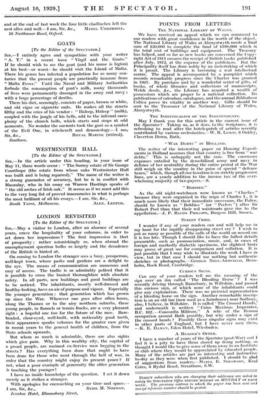POINTS FROM LETTERS
MBE NATIONAL LIBRARY OF WALES.
We have received an appeal which we can commend to our readers with great confidence in the worth of the object. The National Library of Wales at Aberystwyth needs a final sum of /20,000 to complete the fund of 2198,000 which is the total cost of buildings and equipment. The Treasury has helped, and so far as new books are concerned the Copy- right Act of 1911 ensures the receipt of British books published after July, 1912, at the expense of the publishers. But the Principality itself has done nobly by an undertaking of which it is proud. The Library is becoming a real intellectual centre. The appeal is accompanied by a pamphlet which records remarkable progress since the Charter was granted in 1907. By purchase and by a wonderful series' of gifts, of books, of whole libraries and collections of manuscripts, Welsh deeds, &c., the Library has acquired a wealth of possessions which are proper to a national collection. Its publications of calendars, catalogues, and the annual Bibliotheea Celtica prove its vitality in another way. Gifts should be sent to the Treasurer of the National Library of Wales, Aberystwyth.
THE INDIVIDUALISM OF THE INDEPENDENTS.
May I thank you for this article in the current issue of the Spectator? Taking us, as it does, to the Scriptures, it is refreshing to read after the hotch-potch of articles recently contributed by various ecclesiastics.—W. R. LEwis, 6 Oakley, Claverton Down, Bath.
"WAR DEBTS" IN HOLLAND.
The writer of the interesting paper on Housing Experi- ments in Holland assumes that that country is free from 'war debts." This is unhappily not the case. The enormous expenses entailed by the demobilized army and navy in defence of her neutrality during the entire period of the War still weigh on the country in the guise of special "defence taxes," which, though all our taxation is on strictly progressive lines, are a yearly addition to the income tax of the over- whelming anajority of tax-payers.--S.
"BOBBIES."
As the old night-watchmen were known as " Charlies " because they were organized in the reign of Charles I., it is much more likely that their immediate successors, the Police, should be known as " Bobbies " (or "Peelers ") after Sir Robert Peel than that their red waistcoats gave rise to the appellation.—J. P. BACON Pinu,rPs, Burgess Hill, Sussex.
STREET CRIES.
I wonder if any of your readers can and will help me in my hunt for the rapidly disappearing street cry ? I wish to put as many as possible of the calls of the world on record ere it is too late. Though I should like to have the fullest details procurable, such as pronunciation, music, and, in cases of foreign and markedly dialectic specimens, the slightest hints may prove of great use for comparison and collation. It is just possible that I may wish to illustrate the work I have in view, but in that case I should use nothing but authentic sketches Or photographs.—GEORGE NOEL-ARMFIELD, Brun- holm, Rock Road, Cambridge.
CURIOUS SIGNS.
Can any of your readers tell me the meaning of the sign over an inn called 'The Bleeding Horse ' ? I was recently driving through Ramsbury, in Wiltshire, and passed this curious sign, of which none of the inhabitants could give any explanation. There was no pictorial representation of a bleeding horse on the sign. Another remarkable inscrip- tion is on an old inn (now used as a farmhouse) near Sodbury, also, I believe, in Wiltshire. It is called The Crossed Hands,' and underneath is written " C,aius Maximus Imperator, B.C. 102. —Concordia Militum." A relic of the Roman occupation around Bath possibly, but why under a sign of the crossed hands ? Possibly these singular signs may exist in other parts of England, but I have never seen them. —K. E. DAMAN, Eden Hotel, Wiesbaden.
A READER'S OFFER.
I have a number of years of the Spectator (post-War) and I feel it is a pity to have them stored up doing nothing, so thought I would like to give some of them away to an Institute or club where they would be appreciated by educated people. Many of the articles are just as interesting and instructive to-day as they were when first published. I should be glad of suggestions from readers.—MABEL E. STRAWSON, Keal Cotes, 6 Rydal Road, Streatham, S.W.
































 Previous page
Previous page